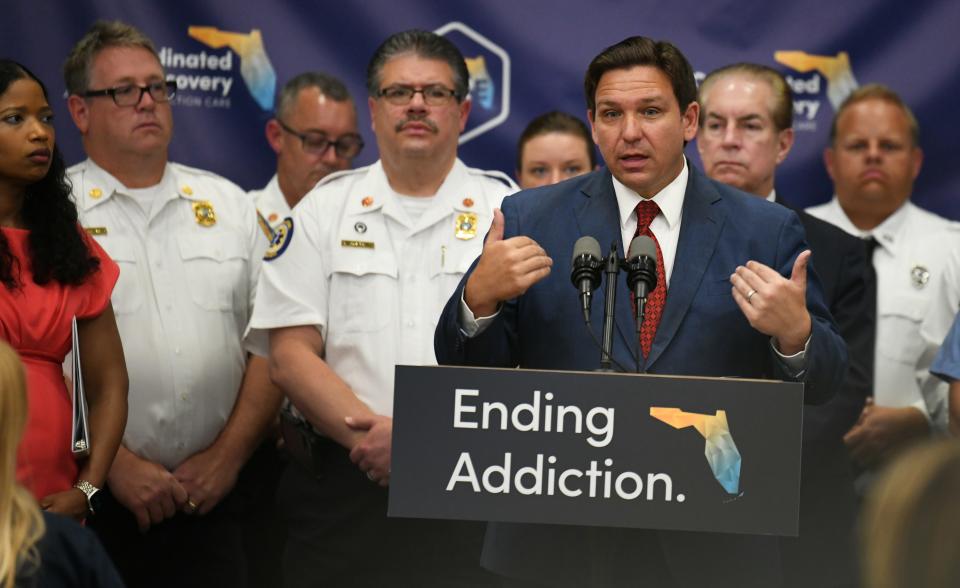Medical groups collaborate after Gov. DeSantis says opioid recovery program to expand to Brevard
- Oops!Something went wrong.Please try again later.
Despite Gov. Ron DeSantis’ announcement earlier this month of a Palm Beach County opioid recovery program expanding to the Space Coast, Brevard County’s major hospitals are not involved in the program, and it’s unclear what protocols have been or plan to be implemented to bring the program here.
CORE, or Coordinated Opioid Recovery, which DeSantis touted as the first of its kind in the nation, began as a pilot program in Palm Beach County in February 2020. The idea is for health care professionals and facilities to collaborate to make the process of treating opioid addicted patients more streamlined, giving them a better chance at recovery.

In Palm Beach County, the health care district, a hospital, the county commisison and paramedics work together for streamlined care.
For instance, JFK North Hospital’s emergency room treats addiction patients who are in the “most acute stage of their illness,” according to the Health Care District of Palm Beach County.
Fire rescue and paramedics know to bring substance abuse patients to JFK North Hospital to receive treatment.
An outpatient clinic is on the same campus and is within walking distance, so patients can continue their care after leaving the emergency room.
The program required training emergency staff to use Suboxone, a medication sometimes used to treat opioid addictions, said Dr. Belma Andric, vice president and chief medical officer for the Health Care District of Palm Beach County.
CORE announced: Gov. DeSantis announces in Rockledge expansion of multi-county opioid recovery program
Narcan on the Space Coast: BCFR to distribute Narcan to help overdose crisis on the Space Coast
"Usually emergency rooms (don't) have that place, that privilege, to keep those patients a little bit longer so they can start withdrawing," she said.
Being able to keep patients through their withdrawals and having the clinic so close by are both factors that help ensure patients follow through with their care, Andric said.
In Brevard, the county's Fire Rescue will collaborate with Brevard Health Alliance and Circles of Care, Brevard’s major inpatient mental health and substance abuse treatment network, said Don Walker, a spokesperson for the county. They must follow up with patients when they are released from treatment facilities.
Other groups have said they are part of the CORE network in Brevard, but it’s unclear how or if they will use the Palm Beach model of care, which DeSantis said is the model program for counties to use.
Stephen Lord, vice president of Circles of Care, said he's unaware of the “specific protocols that have been developed between the health department, EMS and local (emergency departments).”
“We expect that existing Circles of Care opioid-specific treatment programs will continue to provide those services under the local CORE network,” he said in an email.
He said ambulatory programs are available at the Circles of Care Rockledge and Melbourne outpatient clinics and detoxification and longer term residential programs are offered at their inpatient location in Melbourne.
Brevard Health Alliance is not a direct participant in the CORE grant, but it will be working with those involved, said Alicia Moore, director of marketing and public relations.
“We will be partnering in this project by providing primary care services to those individuals who are treated through this program,” she said. “These services will include family medicine, pharmaceutical services and any other ancillary service offered by BHA which is deemed necessary.”
Health First — with hospitals in Melbourne, Palm Bay, Viera and Cape Canaveral, as well as an outpatient facility in Melbourne — is not involved in the program, according to Lance Skelly, a spokesperson for the network.
In 2020, the Space Coast ranked third in the state for overdoses, according to the Florida Department of Health, with 357 people — or 66.7 people per 100,000 — dying of an overdose. More people died of overdoses in Brevard than in more metropolitan areas including Orange, Miami-Dade and Broward counties.
When DeSantis announced the expansion of CORE's network, he said in 2021, the Brevard County Sheriff's Office and the Central Florida High Intensity Drug Trafficking Area Team had seen an increase of 72% of drug overdose fatalities related to fentanyl, a synthetic opioid that is 50 to 100 times stronger than morphine.
The latest statewide data shows that more than 6,150 people died from fentanyl overdoses.
It's unclear when the CORE substance abuse and recovery network will start in Brevard or how addiction patients can become a part of it.
The CORE network of addiction care is coordinated through Florida Department of Health, Florida Department of Children and Family Services and the Agency for Health Care Administration. DCF declined to speak about Brevard's program and directed communication to The Florida Department of Health, representaives of which could not be reached.
Finch Walker is a Breaking News Reporter at FLORIDA TODAY. Contact Walker at 321-290-4744 or fwalker@floridatoday.com. Twitter: @_finchwalker
Support local journalism. Subscribe today.
This article originally appeared on Florida Today: Medical groups collaborate after Gov. DeSantis says opioid recovery program expands to Brevard

